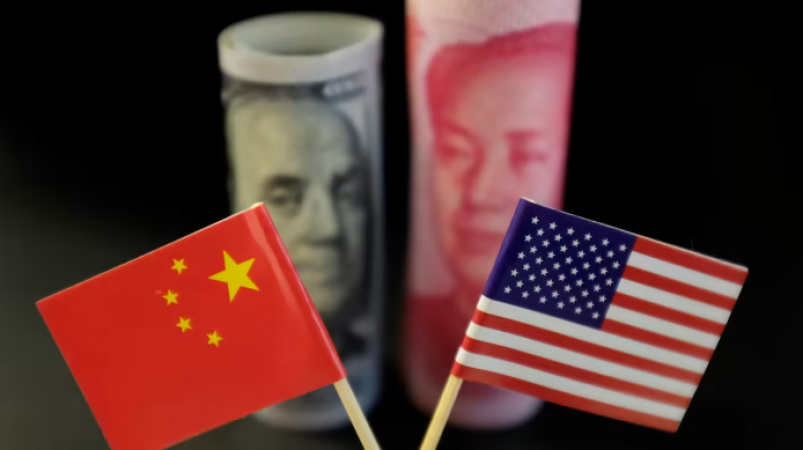
United States: Since the US Federal Reserve promised to use all monetary policy tools at its disposal to "forcefully" control inflation in the US, China's Monetary Authority has less to cut interest rates. There is space.
US Federal Reserve Chairman Jerome Powell on Friday expressed his readiness for "some pain" but acknowledged the global implications of any US policy decision, taking whatever action is needed to tackle inflation. promised to do.
"We will continue to do this until we are confident that the work is done," Powell said at the annual Jackson Hole Economic Symposium in Wyoming.
From their current range of 2.25 to 2.5 percent, economists generally predict that US interest rates will rise to between 3.5 and 3.75 percent. The benchmark interest rate in China is currently 3.65%.
According to Alicia García-Herrero, chief economist at Natixis for Asia-Pacific, this is bad news for China as it further reduces room for cuts, when the Chinese economy needs them most.
But [the People's Bank of China] will need to further tighten capital outflow controls.
The country's economy is slowing because of China's strict coronavirus controls, pressure on the housing market and power shortages caused by the ongoing drought in Sichuan.
Standard Chartered, Goldman Sachs and Natixis earlier this month cut their growth projections for China.
China tried to boost the economy this month by slashing key policy interest rates by 10 basis points in August, the first reduction since January.
In a sale of 400 billion yuan (US$58.3 billion), the People's Bank of China (PBOC) unexpectedly slashed the rate of one-year medium-term lending facilities from 2.85 percent to 2.75 percent.
Powell's remarks show that there are wide differences in the policy of China and the US. While most central banks around the world have raised interest rates in lockstep with the US Federal Reserve, China is bucking the trend by lowering rates to bolster its economy.
Beijing's efforts to slow the economy have been brought down by threats of recession in the West due to rate hikes and market volatility.
After Powell's speech, markets fell, with the Dow Jones Industrial Average falling more than a thousand points on Friday.
According to Yang Delong, chief economist of the Qianhai Kaiyuan Fund, Beijing will continue to prioritize stabilizing its economy and disregarding differences with the West.
According to him, China's central bank has a different target than the US Federal Reserve, which is focused on reducing inflation, and its recent policy of expanding credit is now being tested by declining market confidence. .
Stabilizing economic growth is the central challenge facing the Chinese central bank. This explained its most recent rate cut," he said.
One of its main tasks will be figuring out how to complete the last mile of lending money to businesses or consumers.
Yi Gang, governor of the People's Bank of China, issued an order earlier this week calling on major state-owned commercial and policy banks to take a lead in stabilizing credit supplies and taking immediate action to support economic recovery. instructed.
If the US Federal Reserve accelerates its rate hikes, capital could be drawn to leave China in the US in search of higher returns, and "capital outflows will likely increase in the second half," said chief economist Zhang Zhiwei. According to Pinpoint Asset Management.
Still, he said, it would not be a "major concern for the economy" and domestic problems like Covid-19 and the real estate slowdown are more significant.
According to Dong Jinyu, senior China economist at BBVA Research, although one of China's concerns, capital outflows are not the main issue.
China has a relatively closed capital account compared to other major economies; Capital inflows and outflows should strictly follow programs [like Qualified Foreign Institutional Investors, Renminbi Qualified Foreign Institutional Investors, and certain CONNECT schemes] with applicable quotas.
She continued that the central bank continues to control the yuan's exchange rate and the fact that China's business cycle is not synchronized with that of the United States and the European Union makes its stock market still attractive for global asset allocation.
Zhang claimed that due to its ongoing trade surplus and unrestricted foreign spending, China does not have a balance of payments issue.
Chinese customs data showed the country's total trade surplus rose to US$101.26 billion in July, from US$97.94 billion in June.
However, García Herrero had a different view on foreign spending.
Still, she said, "I would argue that tighter capital controls will not help open the border, especially for the Chinese to travel abroad.
If these activities are allowed now, Yuan will be under even greater pressure, he continued, noting that such activities as tourism and international education Outflow in 2019.
Japan PM Fumio Kishida pledges USD30 billion to Africa
Facebook settles the Cambridge Analytica privacy lawsuit linked to the Donald Trump campaign
Largest wholesale electronics market in the world is closed for four days